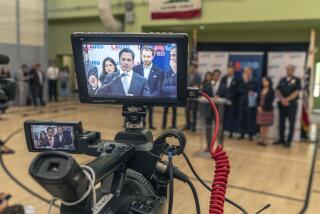Education Chief to Answer Parents’ Calls on Hot Line
- Share via
WASHINGTON — Education Secretary Lamar Alexander, who for months has used a special hot line to talk with experts about how to improve schools, will chat with parents this week.
Alexander will be among more than 130 principals from 50 states and the District of Columbia taking turns answering the toll-free National Principals’ Hotline at the National Assn. of Elementary School Principals convention in New Orleans this week.
“He loves stuff like that,” said Alexander spokeswoman Etta Fielek. “He wouldn’t miss a chance to talk to real people.”
The hot line, 1-800-944-1618, will be open from noon to 8 p.m. today, from 6 a.m. to 6 p.m. on Monday, and from 6 a.m. to 10 a.m. on Tuesday.
Alexander is scheduled to begin answering calls shortly before 8 a.m. Tuesday.
Now in its third year, the hot line was created to aid parents who might feel intimidated by school officials or shy about asking offbeat questions. Bilingual principals and translators will interpret for Spanish-speaking parents.
Last year, Jean Leone, principal of Tinker Elementary in Tampa, Fla., talked with a South Carolina woman who was concerned that her child missed the date for being old enough to enter school by only two weeks. Leone told the parent “that children need time to be children, so don’t rush them along.”
Brent Walker, principal of West Side Elementary in Powell, Wyo., explained to an Ohio third-grader why a teacher isn’t necessarily being mean when she calls on him when his hand isn’t up.
Ninety principals answered 750 calls last year. Samuel G. Sava, association executive director, said 15% of the calls were on kindergarten and readiness, while others addressed problems faced by teachers, and children with physical or mental handicaps, and ways grandparents can help their grandchildren learn.
Each day, Alexander or key Administration officials discuss education issues in a conference call named after President Bush’s education reform program, America 2000. The media and general public are invited to listen in on the five-minute conversation, but can’t participate.
More to Read
Sign up for Essential California
The most important California stories and recommendations in your inbox every morning.
You may occasionally receive promotional content from the Los Angeles Times.













